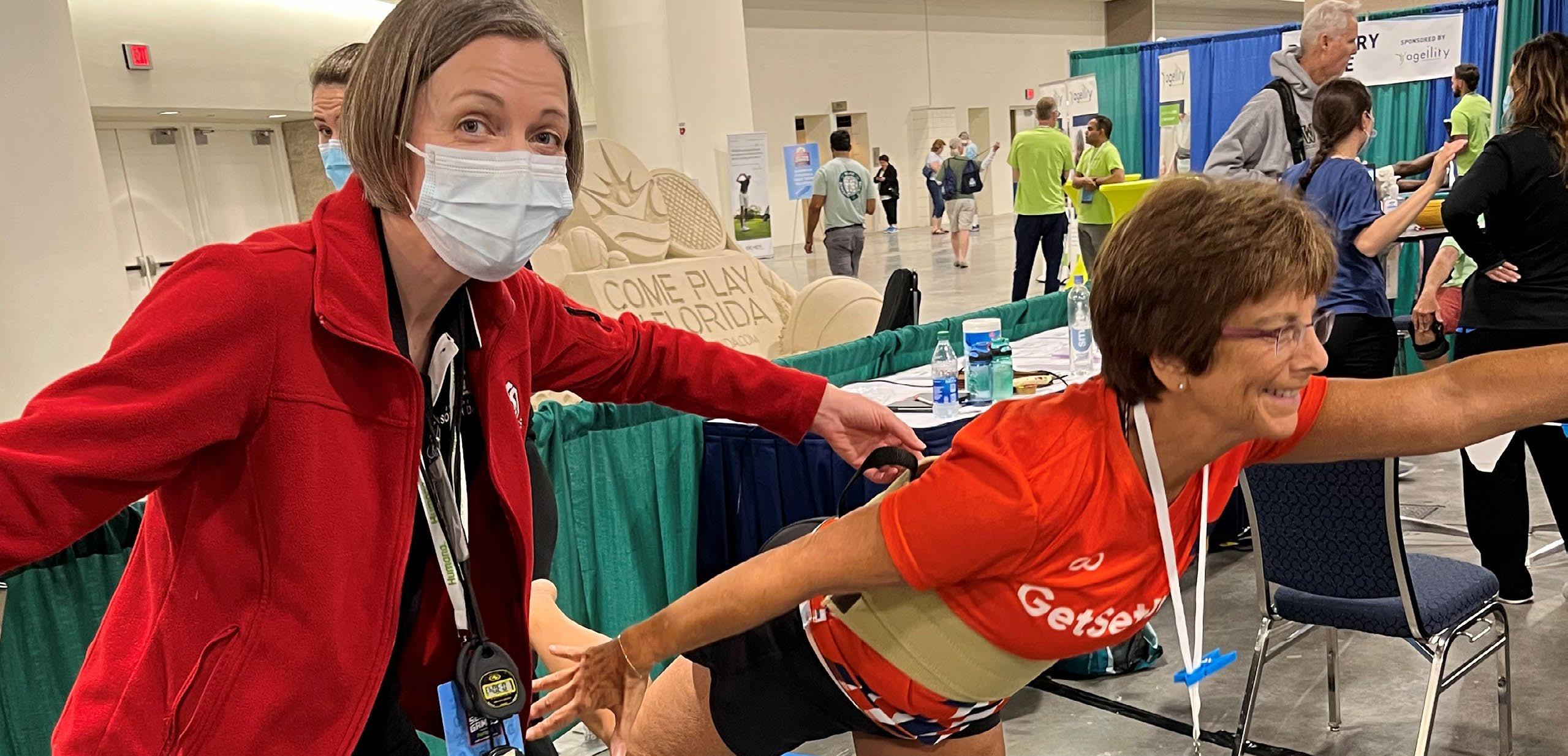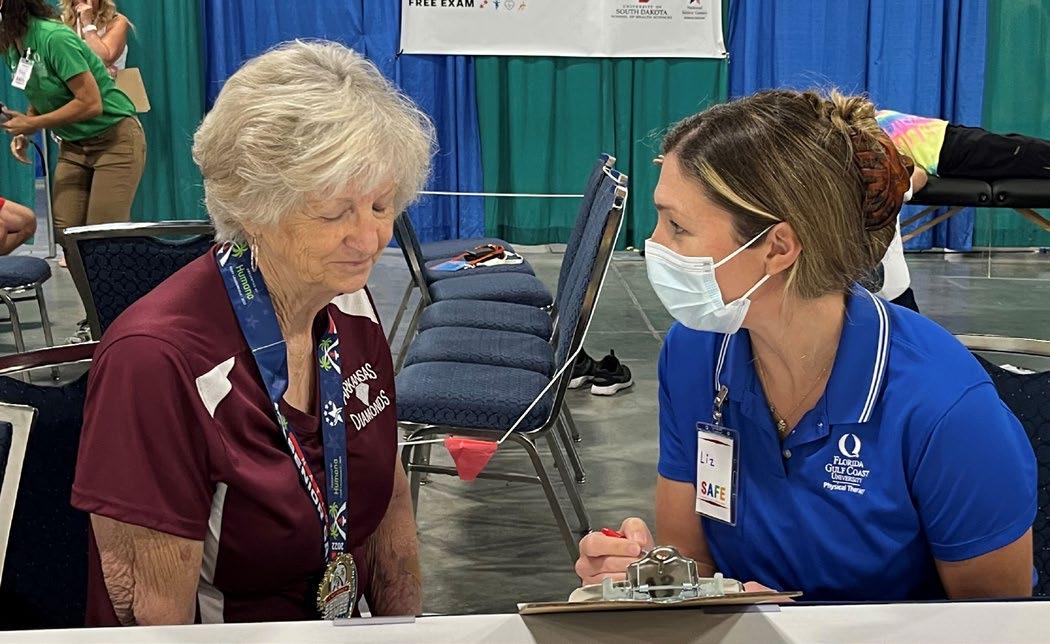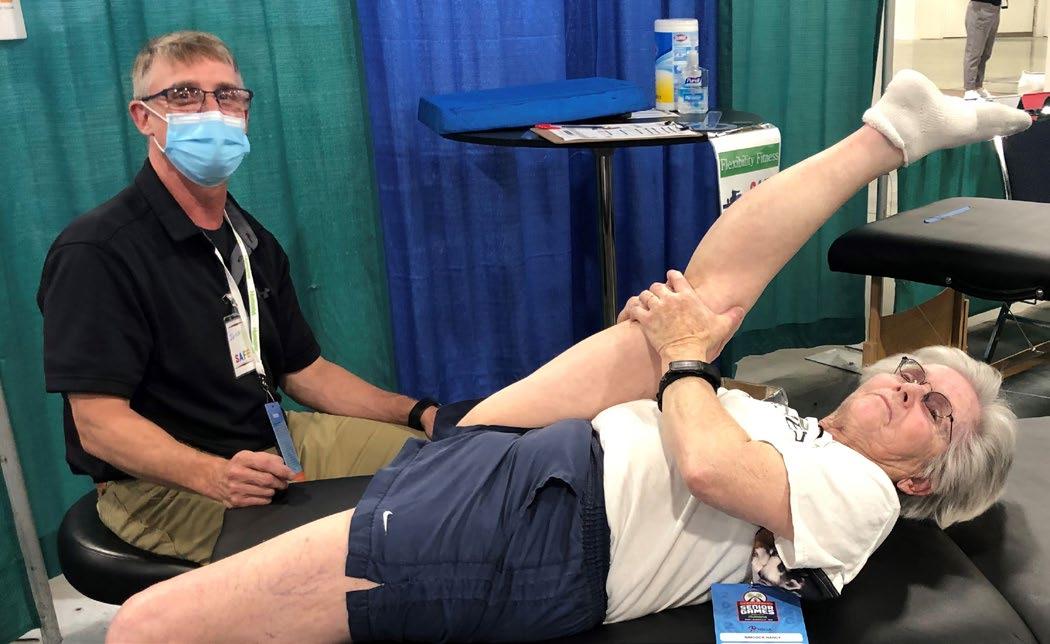
6 minute read
The Senior Athlete Fitness Exam Improving the perception of ageing
Dr. Jordre poses with Ellen Jaffe Jones, 69, a track and field athlete competing in the games and participating in the SAFE for the third time.
The Senior Athlete Fitness Exam
Advertisement
Improving the perception of ageing
by Becca Jordre, PT, DPT, PhD and Wendy Viviers, PT, DPT, MPhil, BS
Over 13,000 older adults gathered in Ft. Lauderdale, Fl., May 9-20, 2022. They were not there to work on their tans. They came to compete! These athletes were registered to compete in one of the 20 sports offered by the 2022 National Senior Games Association (NSGA). This also marked the sixth consecutive games where the Senior Athlete Fitness Exam (SAFE) was provided to athletes.
The SAFE is a screening tool designed to assess cardiovascular, muscular, flexibility, and balance fitness. It utilizes challenging thresholds and norms born from years of research and testing on National Senior Games Athletes. Athletes move through a battery of tests which are divided into stations. Throughout the screen they are scored on a report card which reflects their performance in each area, culminating in a composite score out of 10 points. It is difficult to score a perfect ten on the SAFE; athletes are being compared against norms and thresholds that are population-specific. Athletes take their report card to a final education station where their performance on the SAFE is explained and education appropriate for their needs is provided. This education is not the standard advice typically given to adults aged 50 and above. Rather, athletes are coached on enhancing their training and preventing injury so that they can remain competitive. At any given moment in the education station, one might hear advice on power training, adequate protein consumption, or optimizing exercise intensity to maximize muscular fitness. One may also see a volunteer guiding


an athlete in jumping, sports-specific dynamic stretching, or improving their form with planks. Athletes leave the SAFE armed with new insights into their physical fitness and how they can improve.
This year 850 athletes underwent the SAFE screen during the games. On exit surveys, 99% agreed with the statement, “The Senior Athlete Fitness Exam is valuable to me as an athlete.” The SAFE adds value by giving these athletes the knowledge, and the confidence, to train like athletes, whether for the first time, or again. More than 99% agreed that they would recommend the SAFE to other athletes, and 87% agreed that a consultation with a Physical Therapist was likely to improve their score on the SAFE. The SAFE is a rare opportunity for these athletes to engage with clinicians who are selling a very different message from what they are used to hearing. Gone is the sentiment of being too old to be competitive! These athletes are tired of searching Google for information related to their health and sport. The SAFE is making headway in filling that void and the athletes love it.
Athletes report that they track their progress on the SAFE between games, with many attributing performance gains to the education and information provided.
“I’ve been participating since the test was first introduced at the National Senior Games, said one athlete. It's a great way to track fitness levels over time. I loved the educational component introduced during the 2019 Games. I hope that our test results will be used to raise the recommended minimum standards of fitness, not only for senior athletes, but for the overall population. Never underestimate the ability of older adults to stay fit throughout their lives!”
This year, the SAFE welcomed the assistance of 134 mostly Florida-based volunteers. This included DPT students from 6 different programs and PTA students from one; physical therapy residents from neurological, cardiopulmonary, geriatric, orthopedic, and sports specialties; and several practicing physical therapists. Volunteers consistently relayed their surprise at the distinct differences found when interacting with this population. On exit surveys, more than 98% said they would both volunteer at the SAFE again, and that they would recommend this experience to their colleagues.
“What are you waiting for? You need to be here!” was the response Dr. Marangela Prysianzny Obispo, PT, DPT gave when asked what advice she would give prospective volunteers. Dr. Prysianzny Obispo, a board-certified geriatric clinical specialist, brought 25 student volunteers from the Keiser University – Miami PTA program, and assisted with athlete education over a 3-day period.
Beyond enjoying the experience, more than 99% of volunteers agreed with the statement, “Interacting with Senior Athletes during the SAFE has improved my perception of ageing.” This statement deserves a re-read. Consider the immense value for the future of our profession, if eyes are opened and minds are changed when providers are exposed to the potential of older adults.
As a profession focused on optimal movement, the SAFE event is an excellent opportunity for engaging with this unique and often overlooked population. It provides an experience unmatched in typical clinical settings and can help to establish physical therapists as the providers of choice for older athletes everywhere.
“We have so much to offer this population that is often so very underserved,” says Rosanna Gelaz, PT, DPT, a board-certified geriatric clinical specialist and faculty at the University of Miami - St. Catherine's Rehabilitation Hospital Geriatric Physical Therapy Residency program. Dr. Gelaz brought residents to assist with the SAFE in Ft. Lauderdale, and after spending the day educating athletes, she offered the following advice to anyone considering being involved with the SAFE event: “These athletes don’t get the education that they want, but they want to keep working, they want to keep doing more, and they want to keep getting better, and we totally have the skills and the knowledge to provide that. We need to have the time for them. This is a wonderful opportunity. I would recommend it one thousand percent!”
How to Get Involved
The SAFE is currently offered at State Senior Games events in many states. E-mail Becca Jordre at becca. jordre@usd.edu for information on how to initiate the SAFE in your state.
The SAFE will be offered again in 2023 at the National Senior Games in Pittsburgh, Penn. July 7-16. Watch for calls to volunteer through APTA Engage or the Pennsylvania Physical Therapy Association.
Dr. Jordre, PT, DPT, Ph.D. is a professor of Physical Therapy in the Department of Physical Therapy at the University of South Dakota (USD). She is board certified in Geriatric Physical Therapy and is a Certified Exercise Expert for Aging Adults. Dr. Jordre spends her time teaching DPT students at USD and conducting research on successful ageing.
Dr. Viviers, PT, DPT, MPhil is board certified in Geriatric Physical Therapy. She is a clinician and adjunct professor for multiple Doctor of Physical Therapy (DPT) programs in North Carolina, where she instructs on the Older Athlete. She hails from South Africa where she earned a Sports Physiotherapy Specialization degree from the University of Cape Town. She founded and ran a successful multidisciplinary clinic in South Africa for several years, focusing on management of athletes 35 and older.







